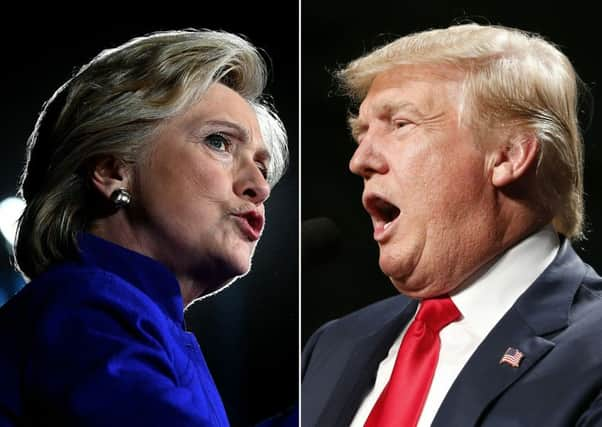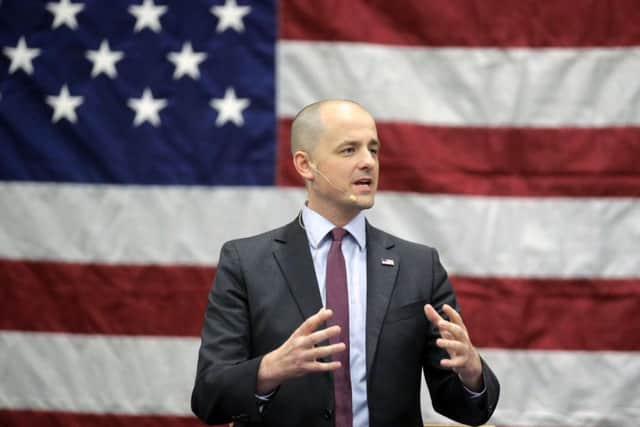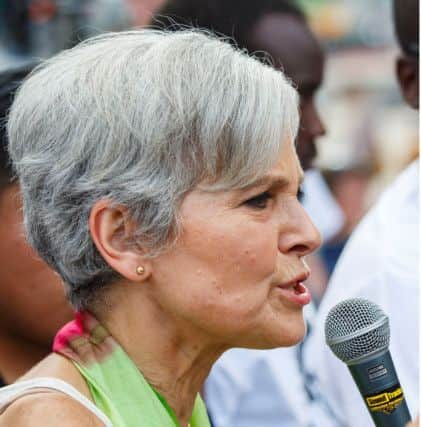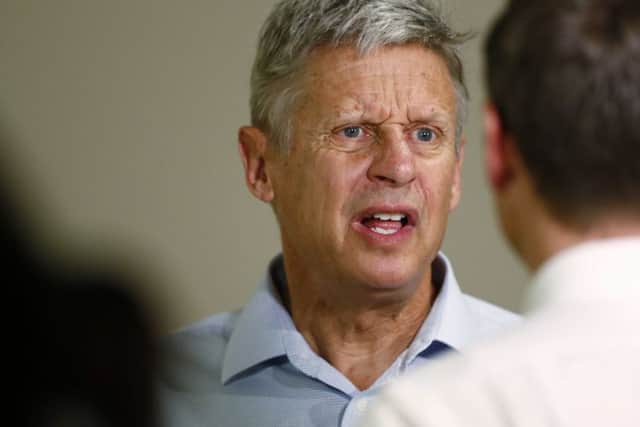Why '˜vote-swapping' is gathering pace in US swing states
This article contains affiliate links. We may earn a small commission on items purchased through this article, but that does not affect our editorial judgement.


A report by Vox reveals that citizens in ‘safe’ Democrat seats - such as California - are offering to vote for third-party candidates in exchange for non-Clinton supporters voting for the Democratic nominee in crucial swing states, such as Pennsylvania, Florida or Ohio.
McMullin, a 40-year-old former Republican ex-CIA agent, is surging ahead in the state of Utah, attracting support from Republicans disillusioned with Trump’s vision for America.
Advertisement
Hide AdAdvertisement
Hide AdThe former investment banker has presented himself as a third-party option in an election where both leading candidates are statistically unpopular. And he has an outside chance of actually becoming President of the United States.


If McMullin wins in Utah - securing the state’s six electoral college votes - and Clinton and Trump both fail to gain the 270 college votes required to win the White House, he could present himself to the House of Representatives as the ‘alternative’ to the Democrat and Republican candidates.
Although still a long shot, McMullin stands a better chance than Stein and Johnson of winning the White House as he is on track to win a state, while the other leading third-party candidates likely won’t. But their supporters could have a say in the outcome of the election.
#NeverTrump
Silicon Valley entrepreneur Amit Kumar developed an app he called #NeverTrump when he realised that his vote for Clinton in California would do little to influence the outcome of the election.


Kumar was aware of large numbers of third-party voters distorting polls across the country, but particularly in key swing states, bringing Trump and Clinton closer together in the run-up to November 8.
The app pairs third-party voters in swing states with Clinton supporters in safe states and, as a result, is moving hundreds - possibly thousands - of crucial third-party votes to Clinton.
The vote swapping is based on an ‘honour system’ - for example Daniel, a Gary Johnson supporter in Ohio, offers to swap his vote to Clinton. Kevin, a Democrat in California, takes Daniel up on his offer and agrees to vote for Johnson. The outcome is that both voters have their say but the vote for Clinton is cast where it counts for more.
Nader’s Traders in 2000


Vote-trading first rose to prominence during the 2000 US election, contested by George W Bush and Al Gore, and third-party candidate Ralph Nader.
Advertisement
Hide AdAdvertisement
Hide AdJamie Raskin, a constitutional law professor, proposed that thousands of Gore voters in Republican-controlled states and the Nader supporters in swing states fearing a Bush presidency could swap votes.
In the now-famous ‘Nader’s Traders’ article, Raskin encouraged Gore voters in safe seats to trade votes with supporters of Nader in key swing states.
Is it legal to trade votes?


Numerous vote-trading websites were established following publication of Raskin’s article and an estimated 35,000 people across the US used the sites to engage with fellow voters and negotiate vote-swaps.
But questions were soon asked about the legality of the system, with the websites shut down amid claims that vote trading contravened state election codes.
Despite the legal tussle, a small number of vote swaps still took place in 2004, with Nader voters backing Democratic nominee John Kerry and vice versa.
Raskin - now a Democratic member of the Maryland Senate running for Congress - insists vote trading is legally sound, thanks to a 2007 court case which established that the practice was ‘clearly protected by the First Amendment’.
He told Vox.com: “Vote trading is simply people talking about how they are going to cast their vote.
“If vote trading is illegal, then political parties are illegal.”


Advertisement
Hide AdAdvertisement
Hide AdRaskin added that vote trading was ‘in some sense, the principal activity of democracy’.
Why are people swapping votes?
Aubrey, from Iowa, wrote on the #NeverTrump app: “I don’t want to see Trump in office. I know voting for Hillary is the best way to ensure that, but I want to vote libertarian according to my conscience and values. I’d still like to support Gary Johnson so he can at least poll a little higher nationally.”
Brian, in Florida, added: “I am staunchly liberal and want to vote for Jill Stein, but I’m also not willing to risk Trump winning Florida by a single vote.”
Many third-party voters have implied that they will seek to keep Trump out of the White House at all costs.
The biggest problem, unsurprisingly, is that numerous Clinton voters are taking to the app in order to swap their vote with a swing state voter, but are finding third-party voters few and far between.
Kumar explains that, as with all marketplaces, there is a balance, adding: “There is always one side with more supply than demand - in this case, it happens to be Clinton voters.”
Other websites and apps have sprung up in the wake of #NeverTrump, including TrumpTraders.org which matches third-party voters with safe-state Clinton voters - but trades two safe-state third-party votes for one Clinton swing state vote.
Founder and lifelong Republican John Stubbs - who admits feelings of ‘horror’ at Trump’s rise - reveals that he fears a Brexit scenario in the US, telling Vox: “I started becoming dismayed with people who were against Trump but didn’t want to participate. They’d say, ‘I live in California! My vote doesn’t matter!’ That’s the same thing I heard from my friends in London before Brexit.”
Advertisement
Hide AdAdvertisement
Hide AdTrumpTraders seeks to capitalise on the higher-than-normal turnout of third-party voters - and Stubbs describes them as people who are ‘willing to put country before party’, but not without getting something in return.
Stubbs’ website therefore offers a ‘two-for-one’ deal; third-party voters in crucial swing states will be matched with two safe-state Clinton voters, ensuring two votes for a third-party candidate and one for Clinton in a swing state - where the Democrat vote will count for double.
While vote trading is highly unlikely to shape this election, those in favour of the practice are hopeful that it might, in time, help to break down the dominant two-party system in the US.